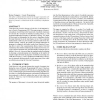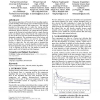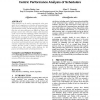1130 search results - page 167 / 226 » Genetic L-System Programming |
107
click to vote
GECCO
2005
Springer
15 years 7 months ago
2005
Springer
Code bloat, the excessive increase of code size, is an important issue in Genetic Programming (GP). This paper proposes a theoretical analysis of code bloat in the framework of sy...
104
click to vote
BMCBI
2005
15 years 2 months ago
2005
Background: We introduce GASH, a new, publicly accessible program for structural alignment and superposition. Alignments are scored by the Number of Equivalent Residues (NER), a q...
104
Voted
WWW
2004
ACM
16 years 2 months ago
2004
ACM
The increasing importance of Unicode for text encoding implies a possible doubling of data storage space and data transmission time, with a corresponding need for data compression...
74
Voted
RECOMB
2002
Springer
16 years 2 months ago
2002
Springer
A new method is presented for use in simulating samples of disease and normal chromosomes bearing multiple linked genetic markers under a neutral model of mutation, genetic drift, ...
116
click to vote
HPDC
2007
IEEE
15 years 8 months ago
2007
IEEE
Utility functions can be used to represent the value users attach to job completion as a function of turnaround time. Most previous scheduling research used simple synthetic repre...



